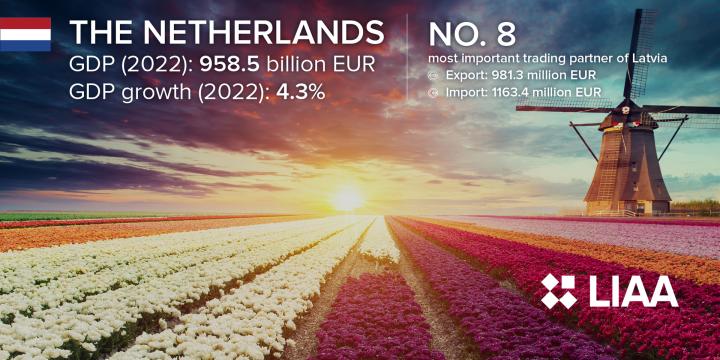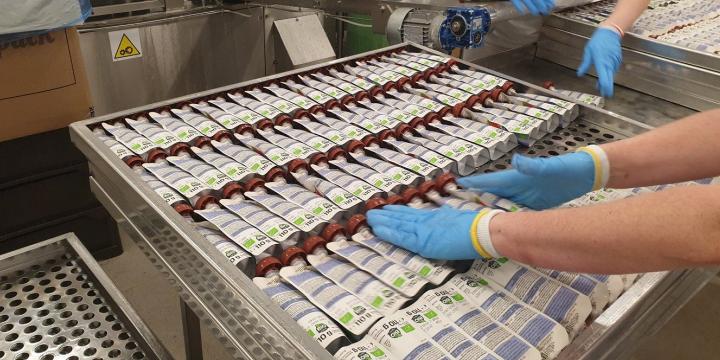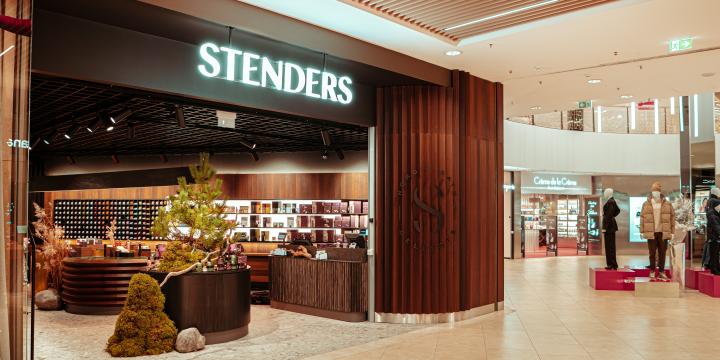Selling to merchants with centuries of experience won’t be easy
Selling to merchants with centuries of experience won’t be easy
The Dutch have always been great merchants, so exporting there is not the easiest thing to do. However, direct communication, horizontal hierarchy and geographical proximity have attracted many Latvian entrepreneurs.
“The economic relationship between the Netherlands and Latvia is much older than many people think. Exports to the Netherlands have always been important for Latvia. I am glad that we are still on good terms,” says Jēkabs Groskaufmanis, Head of Representative Office of the Investment and Development Agency of Latvia (LIAA) in the Netherlands. “There are many reasons for this: a growing market, high purchasing power and almost 18 million people in a territory 30% smaller than Latvia. In addition, the representative office in the Netherlands has been working for almost 20 years and has a long history of supporting Latvian exporters. The Netherlands is and will be a very important export market for Latvia in the foreseeable future,” he points out.
Latvia imports more than it exports to the Netherlands. At the same time, imported products are often processed in Latvia for further export. “On the one hand, the Netherlands is an independent market, but on the other hand it is a logistics hub with very good ports historically. For centuries, it has been one of the keys to a country’s economy,” Groskaufmanis says.
Timber exporters in the Netherlands do best
Latvia’s exports to the Netherlands are rather diversified. But it is Latvia’s most export-oriented timber companies that do best in this market.
“The Netherlands and Latvia have centuries-old ties. In the Netherlands, ships were built using Latvian wood for the masts, so-called Rīga masts. I am pleased to see how, over the centuries, this story has lived on and we have been able to increase the range of exports. We no longer export just timber, which is, of course, still going strong, but also processed timber, including furniture, load-bearing structures and even buildings,” Groskaufmanis says.
Latvia exports both primary value chain products, such as volume grains and seeds, and high value-added food products. “We even export cheese to the Netherlands, which shows that Latvia is a capable food producer,” he says.
In recent years, growing numbers of manufacturers of sophisticated electronic, communication and various optical equipment have been emerging as exporters. Dutch investors and venture capital funds are also showing growing interest in Latvia. “In the past, they might have looked at Western Europe and Northern Europe, but now they are also looking at the Baltics. In order to foster this interest further, TechChill will also be a platform to meet Dutch venture capital funds interested in Latvian start-ups and science-intensive technology companies,” Groskaufmanis says.
Exports are forged at trade fairs
The export of food manufacturer Lat Eko Food to the Netherlands is the result of their diligent exhibition attendance. “We participate in exhibitions organised and supported by LIAA and other organisations. For us, this is one of the main ways to find export partners,” says Egija Martinsone, the owner and Chairwoman of the Board of Lat Eko Food.
Lat Eko Food first met its current partner in the Netherlands at a trade fair in 2018. It took about two years of negotiations, testing, document exchange, visits and quality audits. “It was quite a long process, but now we have been working with the Netherlands for three years,” highlights Martinsone.
Lat Eko Food has two customers in the Netherlands: a distributor and a supermarket chain for which it produces private label products.
“Private label products have enormous power. It is a well-known local brand. Our brand is unfamiliar and unknown to them. Introducing a new brand to people takes years of work. The fastest and largest export volumes, at least in the food sector, are only possible with private labels,” emphasises Martinsone.
Lat Eko Food has been exporting for 10 years, so she knows that both cooperation models have their advantages. “It’s not easy for a newly created brand to take on the world. It takes enormous investments in marketing to make it visible in the world. We already know how difficult it is to promote our brands in Latvia, but it is even more difficult in export countries. It seems utopian to think that one will conquer the whole world in one day with their name. Yes, we can have little bits all over the world, but it will take many years of work. That is why we have chosen to split the risk and work with both private labels and our own brand,” explains Martinsone.
And it has brought a result: The Netherlands accounts for around 15% of Lat Eko Food sales. It is expected to near 20% by the end of 2023. In absolute terms, this is around €1.5 to €2 million.
Work directly with supermarkets
The candle manufacturer SIA Baltic Candles tries to work with supermarket chains without intermediaries, as supermarkets are now switching to this model to make sure they get the best price for their products. The company also works with wholesalers who distribute products to small shops.
“We make large volumes and unfortunately, we cannot deliver our candles to every small shop ourselves. So, we have partners who distribute our products. We also have agents, but we make sure that their work does not overlap with our existing customer network,” says Raivis Stols, Baltic Candles Sales Manager.
Baltic Candles sees its advantage in being able to offer both long candles and tea lights, something no supermarket can do without, as well as a variety of themed candles to celebrate every occasion. “We can provide a full range of products for our customers to have good candle sales,” Stols says.
The Netherlands generates 5 to 8% of the Baltic Candles sales. To diversify risks, the company makes sure that no export country accounts for more than 15-20% of its sales.
According to Stols, the Netherlands, like the rest of Western Europe, is currently in recession. He hopes it is a short-term phase. “But candles are also a good product in various crises, because then people don’t buy new cars, furniture or go on expensive trips, but continue to spend money on candles, which are not the most expensive things,” Stols says.
Key: the right partner
Kristīne Grapmane, CEO of the bath and body care product manufacturer STENDERS SIA, believes that the Netherlands has an efficient tax system, an open economy and a high level of education, which encourages business development. A well-developed logistics infrastructure ensures easy goods logistics.
“One of the criteria for success is finding the right partner,” she says. The partner needs to know the Dutch market, have retail experience, a desire to grow and an understanding of the brand and company values.
STENDERS was approached by a partner in the Netherlands. He got the company’s products as a gift from his son, who is studying in Latvia. Later, he visited the company’s stores and expressed interest in working with them.
A saturated market
“It is not an easy market to work in. But it’s exciting, filled with all kinds of shops and chains. The Dutch are among the best traders in the world, just behind the Americans. So they themselves are actively marketing products from the Far East and elsewhere in their own country,” Stols says.
Martinsone describes their purchasing power as rather high: “The country is at a high level of prosperity and they are interested in good, quality manufacturers. At the same time, the Netherlands is a large and very saturated market. They seem to have enough of everything, they don’t particularly hunger for anything new. This makes getting people interested quite difficult and time-consuming. But it is the same in almost any export market: we are not welcomed with open arms anywhere.. It takes patience to enter a market.”
Competition is fierce
“The Dutch expect functionality at a good price from any supplier. Despite the country’s high purchasing power, status is not that important to them: middle managers will ride their €100 bicycle to the office. This is a very desirable market for manufacturers from many countries, so there is a lot of competition,” Groskaufmanis says.
Grapmane also says that the Dutch cosmetics market is very competitive, but consumers are also open to new brands and products. “Development, at least in our case, is slow. Of course, the overall economic situation is not helping our development at the moment,” she concludes.
Martinsone explains: “Every export productmust find something that makes it better than what is already on the shelf. For one product to go on the shelf, something else has to come off.”
Focus on price
“The Dutch are generally very frugal. They will think several times before making a purchase. They will read everything thoroughly and find out where the products are made and what is known about the maker. The Dutch shop thoughtfully and consciously,” Grapmane says.
Martinsone also notes that price is important in the Netherlands. At the same time, quality must be high. “The Dutch are interested in the price. It’s not easy in this market because there are so many players,” Stols says.
Efficiency is highly valued
Groskaufmanis highlights the Dutch value for efficiency and planning. “Any meeting and communication must be efficient, it must be on time and delays are unacceptable. And if everything is quickly discussed during the meeting, the remaining hour does not get filled with any idle chit-chat. They just get to their next task,” he says.
Stols has also noticed that the Dutch like everything they promise to happen on time and to be done perfectly.
“The terms of cooperation are quite complex, one could even say nitpicky. If there is any problem with quality, they won’t hesitate to point it out. In that market, consumers tend to complain and demand compensation from the manufacturer or seller. We have not seen this so much in any other country. So you have to take into account that if something is not perfect, they will bring every detail to light and demand their rights,” Martinsone says.
Directness and openness is appreciated
Groskaufmanis recommends being as honest and transparent as possible and not being surprised by their directness. Sometimes it may seem rude to Latvians, but it is never meant that way.
“In the Netherlands, businesses value directness and openness. The business culture is one of open dialogue, listening to different ideas and suggestions, while valuing efficient working methods and a streamlined approach. Compared to other markets, the Dutch business culture is informal and innovation-friendly,” Grapmane shares her experience.
Groskaufmanis adds that the hierarchy in the Netherlands is horizontal. Although there is a formal “you” and an informal “you”, the formal one is starting to disappear from the language. “It is also reflected in business - managers in the companies are available. When approaching the companies wishing to contact a specific procurement officer or buyer, do not be shy to speak to them or ask a colleague to forward an email to that person. And expect the same from them,” he says.
Come with a clear plan
“The Dutch have been trading for centuries and have suppliers from all over the world. That’s why you need to come with a clear plan. That’s why it is important to be specific from your very first communication and say what you want and what you offer, so that the other party understands why the communication should continue,” Groskaufmanis explains.
The expert recommends looking at the volumes the company can make and how quickly it can deliver the goods. “The LIAA office in the Netherlands is ready to help businesses prepare if they are interested in this market,” he promises.
Grapmane recommends doing a detailed survey of the local market, competitors and customers’ needs. “Successful cooperation requires an effort to get into the local business culture where business ethics and close cooperation with partners are highly valued,” she says.
Martinsone recommends going there and exploring the market thoroughly: to walk through the supermarkets, to look at the products, prices and brands: “The best way to understand a market is to go there and immerse yourself in society and environment. You certainly cannot experience it as well online as you can in the real setting.”
When Baltic Candles chose that market 15 years ago, it was not by chance. “We started by analysing the market: what players are there, who our main competitors are. When we chose our customers, we approached them with specific products and were confident that we could interest them,” Stols says.
When choosing an export market, Baltic Candles analyses the candles consumption in kilograms per person. “Candle burning culture is very common in the Scandinavian countries and the Dutch market is the next market of interest for candle makers as top 5 in terms of candle burning volumes,” Stols says. The Netherlands is also home to more than 17.5 million people, roughly the same as the whole of Scandinavia.
A great potential
STENDERS sees great potential for business development in the Netherlands, especially in Benelux, i.e. the Netherlands, Belgium and Luxembourg. ”The Dutch are interested in high quality and innovative products, which means good potential and opportunities for our development. But it will take time. The brand needs to gain recognition,” Grapmane says. The company sees the Netherlands as part of the Benelux market, which is a sufficiently large and interesting European region.
Groskaufmanis warns against confusing the Dutch with the Flemish or the Belgians in general: “There is a healthy competition among them, same as Latvians have with Lithuanians and Estonians."
He adds that many Dutch people are surprised that Riga is only a two-hour flight away and has its own airline and other things which for us are something that goes without saying. “I am happy every time when after an investor’s visit or a trade mission to Latvia stereotype shatter and people see that Latvia is Northern Europe, not Eastern Europe,” Groskaufmanis says.
Article made in cooperation with Latvian Exporters Association "The Red Jackets'', www.eksportabarometrs.lv.




